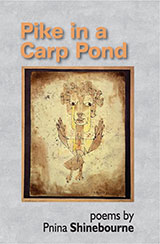Pike in a Carp Pond - OUT OF PRINT

Pike in a Carp Pond is a book about vision and resilience, imagination and the making of meaning. In her first full-length collection, Pnina Shinebourne re-imagines the lives of two major twentieth-century figures – the English painter Stanley Spencer, and the German Communist leader Rosa Luxemburg. While Spencer (1891-1959) found glimpses of heaven in the lives of Cookham villagers, soldiers in the trenches and shipyard workers on the Clyde, Rosa Luxemburg (1871-1919) spent her life trying to build a socialist society free from political, social and economic oppression. One was an artist, the other a politician, but Pnina Shinebourne argues that they were both revolutionaries who combined the literal and the visionary in their desire to articulate our aspirations for a better world.
Cover image: Paul Klee, Angelus Novus (Israel Museum, Jerusalem)
Sample Poems
Comrade Luxemburg is ready
to enter the hall black dress hair pulled back tight a stern gaze unflinching a crimson bloom in her cheeks [What she thinks] I want to affect people like a clap of thunder to inflame their minds with the breadth of my vision and the strength of my conviction she steps up to the platform a slight limp a twitch of a muscle as she steadies herself flanked to her left by a portrait of Karl Marx. Waves of applause fists clench cheers rise up through the air [What she says] The mass strike is the living pulse-beat of the revolution – the most powerful driving wheel of the proletarian struggle to keep your fighting energy alive!!! On the train home a frozen drizzle turns to sleet a figure scrambles down the foggy platform clutching a bunch of flowers [What she writes to her lover] I imagined you waiting on the platform wild hyacinths in your arms why didn’t you come? In a flash I drew a groggy smudge across your face. I hate you! I could kill you!
Soup
the icy Sunday afternoon the thrill on the lips the velvety-sweet texture of a steaming beetroot soup the splash of sour cream the lumpy clutter in her throat the box of old letters kept hidden under the bed letters from mother she was too busy to answer (The Goddamn politics!!! always so so busy) last night she went to bed wishing never to wake up
Comrade Lenin directs Comrade Luxemburg on the set of The Russian Revolution
aft Anne Carson [Rosa gets a final touch-up to her eye make-up] Vladimir: 30 seconds to go. You walk towards the door, pause, and then return to your desk. Look at the cue-card. Rosa: The mighty sweep of the revolution in Russia – the light is weird I can’t see the card V: Raise your head a bit, like this. R: The mighty sweep of the revolution in Russia all power in the hands of workers – can’t see [Cue-card operator tilts the cards up a bit] the bourgeois state is an instrument of oppression of the working class V: Too monotone think inspirational try again from ‘the working class’. R: the working class grasped the mandate and duty all power exclusively in the hands of the proletariat and the peasant masses [Rosa walks to the cell’s window, leans forward, her nose pressing against the bars] R: and with their sharp pointy wings the swallows snip the blue silk of space into little bits V: You’re flagging again stay focused keep the tension. [Rosa walks back to her desk, stops, waves the cue-card operator out of the way] R: Freedom only for the supporters of the government – only for the members of one party – is no freedom at all. Freedom is always for the one who thinks differently V: Not quite. Cut.
The last time
after Gabrielle Calvocoressi I saw Rosa Luxemburg it was a warm summer evening, dozy shadows of maple trees crawled along the railway bridge. At the tobacconist a man in a collared shirt shouted into the telephone what? I’ll be there around 5 o’clock, fine, goodbye, and put a cigarette to his mouth. I was distracted by a boy edging to the kerb right in front of a car. I missed her crossing the bridge, caught only her arm waving to the one-eyed news vendor on his way to the Kneipe, heard her voice calling out to him how will you get home, alone in the dark?
Roslein Rot
She sat on the bed and waited. Goethe’s Faust in her handbag. She heard her name. She did not look up. * Sound of hobnailed boots. She put on her coat pulled on her gloves. * I watched her walk into the lobby, two militiamen at her side. In the dining room a grand buffet was laid out. Crowds gathered, chanting here comes the old whore Roslein Oh! Roslein Rot * I took a deep breath. Clenched my fist before I raised the butt of my rifle. Someone picked up a shoe dislodged from her foot. We dragged her into the street. * When Lieutenant Vogel fired his pistol, she paused, as if amazed that death had met her on a freezing Berlin night. A soldier threw a blanket over her head. * A splash. A shudder. A man walking his dog along the Landwehr canal saw soldiers hurl a bundle over the bridge. A thud, a crash through thin sheets of ice into dark water– the old slut is swimming now Roslein Rot Oh! Roslein Rot
Google Earth
Someone is sitting by the window, clicking. It is Rosa, zooming to Tiergarten on Google Earth. A mouse-scroll over clusters of purple-tinged elderberries nestled in feathered leaf-fronds. Along the path ants scurry about, pause, swirl, reverse, wander around tufts of huddled leaves. In the dialogue box: Robert Hass ‘having some dim intuition of a poem made luminous’. A double-click on placemark to Sudende to a close-up of Mimi lying in the sun folded together like a soft package blinking at a hovering wasp. Tilt view: Rosa is in her kitchen squishing ripe gooseberries. Mixing in granulated sugar, boiling for ten minutes. Flash: Winter of 1905. St Petersburg. A hundred thousand workers march to the Winter Palace. Troops open fire. Cossacks gallop through the crowds. Pools of blood on fresh snow. Flash: Mutiny on the battleship Potemkin sailors refuse to eat borscht infested with maggots. Jump to Huffman Prairie: The Wright brothers’ third flier circles the air for 39 minutes 23 seconds. On the screen a yellow pin with flashing crosshairs is homing on Mumbai. Close-up: Platform two. Shanti Mishra waits for the ten-fifteen train. A sudden shudder, a barrage of bullets rips open her ribcage. Outside the station two men reloading assault rifles hurry, then pause, waving in glee. Flashback: A blur of pixelated edges. She sees herself smuggled across the Polish border hidden under straw in a peasant’s cart. Voice-over: a sound of whirring. It’s Gretchen at the spinning wheel, singing of a kiss and a promise. Fly to: Frankfurt, 1914. A packed courtroom spilling over into the street. The woman in the dock is Rosa, on trial for calling to refuse to take up arms. Dissolve into a prison, 1917. Like a bumblebee on its back, legs tucked-in, numb in the autumn frost, she struggles to roll over and rise. Flash forward: the past seems to catch up as if propelling her into the future – 2010. A man walking his dog in Tiergarten stops under the Lichtensteinbrucke to touch the raised letters on a cast-iron plate at the spot where her body was thrown into the canal. She is pleased to see bikers cycling along the path.



